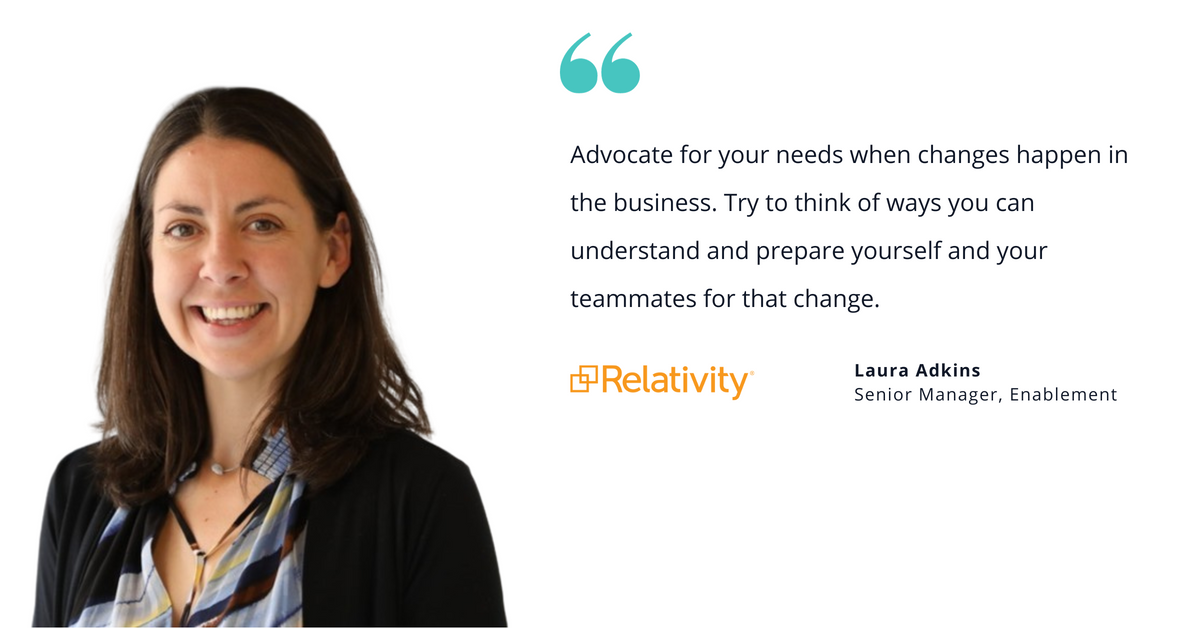For Laura Adkins, senior manager of enablement at Relativity, enablement is about creating clarity in the face of change.
“For example, say your company is releasing a new product,” she says. “What does the Support team need to know to be able to answer questions from customers for that new product? What systems do the Sales and Success organization need to be able to adapt to the update? Do they have the information that they need available in their systems and part of their processes?”
Rather than producing a static piece of content, effective enablement presents information in a “way that leads to a behavior change, learning, and reaction that will enable the customers (internal or external) to do their part in helping the company achieve a result.”
As a leader at Relativity, Laura has relied heavily on enablement to increase the efficiency of her team while bolstering employee satisfaction. We sat down with her to discuss her journey into the technology realm, and why enablement is a source of excitement for her.
Finding the right fit at Relativity
Even while starting her career in education, Laura was fascinated by enablement.
“For me, it’s always been about finding the best way to approach a problem or task,” she says. “The reason that I got into technology and learned to code was the idea that I could create technology that would make my daily tasks easier and/or automated for myself.”
Pivoting away from her background in education, Laura decided to enroll in a coding boot camp where she quickly discovered a love for Structured Query Language (SQL), a programming language for storing and processing information in a relational database.
“I looked for companies and roles that had requirements to work with SQL so that I could grow those skills,” she recalls.
Enter Relativity, a global legal technology company that helps users organize data, discover the truth, and act on it.
“I am a person who leans on instinct and intuition, and I can’t say anything more than it just ‘felt right.’ Every person I met during the interview process was welcoming, kind, intelligent, and helpful. I knew that it was the right fit for me both in how I wanted to grow my skills and the type of colleagues I wanted to work with,” Laura shares.
Deep diving into enablement
Laura's first leadership role at Relativity involved managing a small project team.
“As we understood what our various high-level services were, we realized that our teams needed more information about changes that were occurring — especially updates to our products. Our customers cannot have a good experience with new products if the teams that are providing services are not ready to answer their questions and assist them with these new products,” Laura explains.
To provide the best possible customer experience, she and her colleagues started a process called Service Delivery Readiness. The program ensures teams are prepared to answer customer questions and support updates, ultimately reducing time to resolution and the volume of customer contact.
When a role opened on the Enablement team, Laura eagerly accepted the opportunity.
She smiles and says, “I am in a role that really suits me and leverages my various experiences to create really awesome outcomes with a fantastic team of professionals.”
Why enablement is empowerment
While enablement may be prudent for business, Laura also recognizes that its purpose boils down to helping employees.
“For me, the satisfaction comes from an increase in employee satisfaction and, in those terms, cost savings in terms of employee retention and people time. Some estimates show that team members spend over 20% of their time searching for information. That adds up to an extra 8-hour workday every week. Imagine the gains that your business could unlock if team members knew that they would get information easily at this day and time.
"You also see higher levels of customer satisfaction due to the consistency of the message. Customers hear the same information from all team members with whom they interact, which creates confidence. Enablement, in my mind, is about empowerment!”
Embracing an enablement mindset within your business
Laura leaves us with a few pointers on how to embrace an enablement mindset within our organizations, no matter our role.
- Empathize. Do your best to put yourself in the shoes of anyone in the organization who might be impacted by a change you’re making or know about, and advocate that they get the information they need to prepare for the change.
- Be your own advocate. Advocate for your needs when changes happen in the business. Try to think of ways you can understand and prepare yourself and your teammates for that change.
- Get ahead of change. Always be thinking of how you can ‘get to the left’ of change and do your best to think of systems you can put in place to get information sooner so you have more time to prepare.
- Prioritize, prioritize, prioritize. Prioritization is your best friend. Find criteria to think through what kind of changes or updates need immediate attention.





